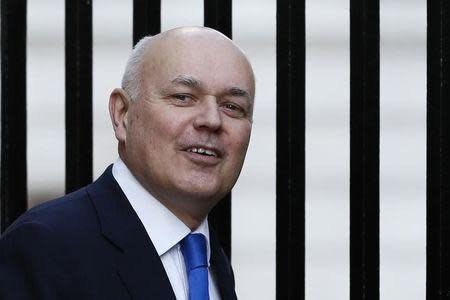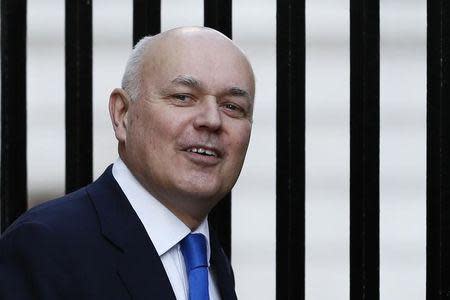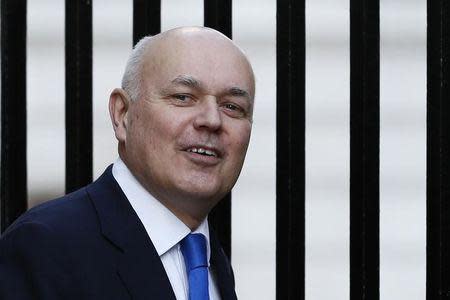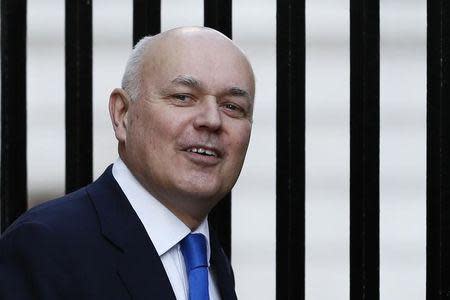'Quiet man' threatens to blow Britain's ruling party apart over Europe
By Stephen Addison
LONDON (Reuters) - British Prime Minister David Cameron was forced into a hasty cabinet reshuffle on Saturday as the dramatic resignation of a senior minister threatened to widen divisions over Europe within the ruling Conservative party.
The rancorous departure of Work and Pensions Secretary Iain Duncan Smith, a leading campaigner for Britain to quit the European Union, also deals a blow to the political ambitions of Chancellor George Osborne, commentators said.
Cameron and Osborne are both urging Britons to vote to remain in the EU in a June 23 referendum but many Conservative members of parliament and activists favour a "Brexit". The issue has riven the party for decades.
In his resignation letter on Friday, Duncan Smith, a former Conservative party leader, cited cuts to disability benefits outlined in Osborne's annual budget last week, which also included tax cuts for richer households. He complained about pressure from the Treasury to cut welfare payments in order to meet fiscal conditions set out by Osborne.
"I am unable to watch passively whilst certain policies are enacted in order to meet the fiscal self-imposed restraints that I believe are more and more perceived as distinctly political rather than in the national economic interest," he wrote.
By suggesting that cuts were hitting the poor harder than the rich, Duncan Smith also cast doubt on one of Cameron's key mantras, that austerity was being equally shared by all.
His letter concluded: "I hope as the government goes forward you can look again ... at the balance of the cuts you have insisted upon and wonder if enough has been done to ensure 'we are all in this together'."
Responding, Cameron said he was "puzzled and disappointed" by Duncan Smith's decision to leave the Cabinet post he has held since 2010. On Saturday, he appointed former Welsh Secretary Stephen Crabb, who wants Britain to stay in the EU, to the role.
ECHOES OF GEOFFREY HOWE
The bitter tone of the letter from the self-styled "quiet man" of British politics was reminiscent of a speech made by senior minister Geoffrey Howe when he quit Margaret Thatcher's cabinet in 1990 over Europe, which contributed to her downfall.
Cameron, who has a majority of just 12 in the 650-seat lower house of parliament, has said he will step down before an election in 2020 and close ally Osborne hopes to replace him as Conservative leader and prime minister.
But he faces a growing rebellion over the plan to tighten eligibility criteria for a state benefit which supports the disabled or long-term sick.
Osborne has run into problems before with measures announced in his budgets and was forced into a U-turn last year over proposals to cut tax credits for lower-earning families.
In 2012, after a budget derided by the opposition Labour Party as an "omnishambles", he dropped plans to apply value-added tax to food typically bought by poorer households.
Bookmakers on Saturday lengthened the odds on the chances of Osborne succeeding Cameron. In contrast, odds have shortened on another potential successor, London Mayor Boris Johnson, who is backing a 'Out' vote in June.
"So sure-footed for so long, Mr Osborne was widely regarded as Cameron's natural and chosen successor, but recent blunders seem to have dealt him a serious blow to achieving that outcome and punters have begun defecting from him to Boris," bookmaker William Hill said. "Mr Duncan Smith's resignation has dealt Mr Osborne another blow."
After unexpectedly winning last May's election outright on promises to fix the public finances, the Conservatives have lost popularity as the scale of planned cuts has become clear and opinion polls last week put Labour level or slightly ahead.
Labour leader Jeremy Corbyn seized on Duncan Smith's move to highlight government divisions and said Osborne should resign.
Most commentators believed Duncan Smith's resignation was a genuine matter of principle but several noted he would now be free to campaign within parliament for an EU 'Out' vote.
"Mr Duncan Smith's departure blows apart any prospect of a restrained debate in the ... party over Europe," wrote the Financial Times.
(Editing by Catherine Evans)






